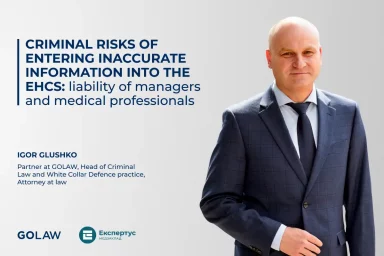July news digest
Contents
Corporate Law Practice
The NBU continues to take steps to improve the investment attractiveness and defense capability of Ukraine
By the Resolution of the Board of the National Bank of Ukraine dated 09 July 2024 No. 83 “On Amendments to the Resolution of the Board of the National Bank of Ukraine dated 24 February 2022 No. 18,” the NBU updates a number of currency restrictions. The amendments will come into force on 11 July 2024.
The changes are aimed at increasing Ukraine’s investment attractiveness and attracting private foreign capital. For this purpose, the NBU:
- enabled domestic businesses to reimburse non-residents for expenses incurred due to their participation in providing external credit to a Ukrainian borrower. The condition for such an operation is that the guarantor, surety, or insurer of the external credit must be a foreign export credit agency, a foreign state, or an international financial organization (IFO) acting as the guarantor or surety for such an obligation;
- allowed the transfer of funds to foreign companies, among whose shareholders is a foreign state, for the payment of insurance premiums under contracts that provide coverage for war risks on the territory of Ukraine;
- enabled residents to transfer funds under the guarantees or sureties provided by them, which ensure the fulfillment of the obligations of resident borrowers under external loans and borrowings;
- regulated the ability of resident borrowers to purchase foreign currency for its reservation under a loan agreement with an international financial organization (IFO), which will increase support for Ukrainian businesses from IFOs;
- introduced clarifying amendments to the May liberalization package, which allowed for scheduled interest payments on external corporate debt;
- expanded the list of defense-related goods that individuals-volunteers are allowed to purchase abroad. The specified list will include components for UAVs, as well as thermal blankets and thermal heaters;
- in addition to the ability to make charitable contributions in foreign currency by non-residents within Ukraine, the NBU has enabled them to make corresponding transfers in hryvnia. Such contributions can be made to the accounts of both state bodies and charitable foundations;
- granted permission to individuals to return social benefits received in a foreign state. These changes will allow Ukrainians to fulfill obligations to the competent authorities of foreign states, thereby preventing the deterioration of conditions for providing assistance to forced migrants;
- enabled businesses to pay fees for actions related to the protection of intellectual property rights, including the payment for services provided by patent offices of other countries and services of patent attorneys abroad;
- specified the rule regarding the existing limit of UAH 100,000 per day for the purchase and sale of cash foreign currency using non-cash funds in hryvnia, which corresponds to the limit on the issuance of cash from clients’ current accounts. The clarification applies exclusively to non-cash funds, so Ukrainians can continue to conduct currency exchange operations with cash without any amount restrictions.
In addition, the list of operations for the accounts of foreign companies has been clarified. For this purpose, the Board of the National Bank of Ukraine approved Resolution No. 82 “On Amendments to the Regulation on Protective Measures and the Procedure for Certain Foreign Exchange Operations” on July 9, 2024, which also comes into effect on July 11, 2024.
Starting from 24 July 2024, the list of clients and depositors that can be served by the NBU will be expanded
The NBU approved amendments to the Regulations on Conducting Depository and Clearing Activities and Ensuring Settlement of Transactions with NBU Securities to provide foreign investors with direct access to marketable debt instruments (except government securities) aimed at rebuilding and recovery of Ukraine.
Thus, starting from 24 July 2024, the list of clients and depositors that the NBU can serve in its capacity as a depository institution will be expanded. In particular, the NBU will be able to open and maintain a nominee securities account for a foreign financial institution that meets the requirements of Ukrainian legislation and a securities account for a foreign depository.
The opening of a nominee securities account for a foreign financial institution will allow the infrastructure of the domestic and international financial markets to be connected to ensure access of foreign capital to Ukraine. This will pave the way for foreign investment in financial instruments issued for the reconstruction of the country. These include local government bonds, infrastructure bonds, bonds issued by international financial institutions, and other debt financial instruments aimed at rebuilding Ukraine.
“ePermit”: Entrepreneurs will be able to obtain licenses in electronic form.
Entrepreneurs will be able to obtain licenses and permits in electronic form. The Government made the decision to launch a pilot project to introduce the Unified State Electronic System of Permits (ePermit) at a meeting on 5 July 2024.
According to the pilot project, participating entrepreneurs will be able to submit applications and relevant documents in electronic form in order to obtain, renew, suspend or terminate licenses, expand or narrow their business activities, etc. Inform about changes in the documents and other data attached to the application, create and submit declarations on the compliance of the material and technical base with the requirements of the legislation on labor protection, receive information on the status and results of consideration of electronic documents, pay for the provision of administrative services and complain about actions (or inaction) of the licensing authority that violate the requirements of the licensing legislation.
At the first stage of the pilot project, the following services will be provided: licenses for tour operator activities, veterinary practice, circulation of narcotic drugs, psychotropic substances and precursors, pre-school education, and a declaration of compliance of the material and technical base with the requirements of labor protection legislation.
Proposals to Reinstate Tax Exemptions for the Importation of Generators, Inverters, and Power Banks
On 18.07.2024, the draft laws have been submitted for review:
- No. 11403 – on amendments to the Customs Code regarding the extension of the preferential regime for the import of electric generators and related goods.
- No. 11404 – on amendments to the Tax Code regarding the extension of the preferential regime for the import of electric generators and related goods.
The draft laws propose to extend the favorable import regime for generators and inverters and components for their operation/repair, as well as eco-flow, power banks, etc., until 1 June 2026.
Laws on exemption from customs duties and VAT on imports of energy equipment into Ukraine came into force
Laws No. 3854-IX and No. 3853-IX, which amend the Tax Code and the Customs Code of Ukraine to simplify the import of energy equipment and components for the production of mechanized demining machines, have come into force.
The laws provide for exemption from import duty and value-added tax on materials, components, assemblies, including machine sets imported for the production and repair of demining machines.
It also provides for exemption from tax and customs duties on the importation of energy equipment. Specifically, this includes generator equipment, batteries, and equipment for wind and solar generation. Additionally, the exemptions apply to the importation of equipment for the production of counter-intelligence devices.
Tax Law Practice | Tax Alert
The law on the peculiarities of bona fide taxpayers’ administration came into force
On August 1, 2024, the Law of Ukraine as of June 18, 2024, No. 3813-IX “On Amendments to the Tax Code of Ukraine on the Peculiarities of Tax Administration during Martial Law for Taxpayers with a High Level of Voluntary Tax Compliance” (Draft Law No. 11084) came into force, except for certain provisions.
In particular, starting from October 1, 2024, the provisions of the law will come into force, which, for the period of martial law and until December 31 of the year of its termination, establish the peculiarities of the administration of taxes, fees, and payments for taxpayers with a high level of voluntary tax compliance.
Such taxpayers will include legal entities and individual entrepreneurs that will simultaneously meet the established requirements and criteria and will be defined in a separate list. The State Tax Service of Ukraine will form and approve this list no later than the last business day of March, May, August, and November.
For the period of their inclusion in this list, some peculiarities of tax administration are set out. For instance, the tax authority does not initiate factual audits on specific issues and some documentary unscheduled audits; the term for conducting desktop and documentary audits for VAT budget refunds is 5 and 10 business days, respectively, and others.
More details on the novelties we described here.
VAT and import duties exemption for equipment for energy infrastructure, demining, and countering technical intelligence
On July 27, 2024, the following laws entered into force:
- The Law of Ukraine as of July 16, 2024, No. 3853-IX “On Amendments to Subsection 2 of Section XX ‘Transitional Provisions’ of the Tax Code of Ukraine on Exemption from Value Added Tax on Importation of Goods for the Needs of Production and/or Repair of Mechanized Demining Machines”;
- The Law of Ukraine as of July 16, 2024, No. 3854-IX “On Amendments to the Customs Code of Ukraine on Exemption from Import Duty on Goods for the Needs of Production and/or Repair of Mechanized Demining Machines, Goods Contributing to the Restoration of the Energy Infrastructure of Ukraine, and on Certain Peculiarities of Customs Clearance of Goods Intended for Security and Defense Needs”.
Inter alia, these laws establish, for the period of martial law, but no longer than January 1, 2026, exemption from VAT and import duties for:
- Operations on the import of steam, hydraulic, gas turbines, electric generating sets, certain types of alternating current generators, inverters, and certain other equipment for the energy sector;
- Operations on the import of certain goods that are carried out under the agreements financed by the Energy Community Secretariat. The list of these goods with the codes according to the Ukrainian Classifier of Goods for Foreign Economic Activity will be approved by the Cabinet of Ministers of Ukraine.
In addition, until the termination of martial law, it is envisaged to exempt from VAT and import duties the operations on the import of components of unmanned systems, active counterweapons for technical intelligence, and mechanized demining machines imported by the business entities for use in their activities for the production and/or repair of the said systems, counterweapons, and machines.
The law on increasing the excise tax rates on fuel was adopted
On July 18, 2024, the Verkhovna Rada of Ukraine adopted the Law of Ukraine “On Amendments to the Tax Code of Ukraine on the Implementation of the Provisions of the European Union Law on Excise Tax” (Draft Law No. 11256-2).
According to the text of the draft law, a gradual 4-stage increase of excise tax rates on fuel will be introduced and will last from September 1, 2024, until January 1, 2028.
The explanatory note to the draft law states that the new excise tax rates will meet the provisions of Council Directive (EU) No. 2003/96/EC.
It is also stipulated that during the period of martial law and within 30 days after its termination, and in some cases – until the date of termination of the possibility of hostilities/date of completion of hostilities, the following premises/territories are not considered to be an excise warehouse:
- In each of which the total capacity of fuel storage tanks used exclusively for refueling electric generator sets does not exceed 2000 liters;
- Located in the territories of possible, active hostilities (for which the end date has not been determined), each of which has a total capacity of fuel storage tanks used exclusively for refueling electric generator sets of no more than 5000 liters (except for certain cases);
- In each of which the conditions mentioned above are met and fuel is also stored or distributed in a consumer container with a capacity of up to 5 liters inclusively, if the fuel was received from the manufacturer or the person who bottled the fuel in such a container.
The law is currently being prepared for signature and, if signed by the President of Ukraine, will come into force on September 1, 2024 (except for certain provisions that will come into force later).
Environmental tax exemption for carbon dioxide emissions from facilities using biofuel as the only type of fuel
On July 16, 2024, the Verkhovna Rada of Ukraine adopted as a basis, with further revision, Draft Law No. 9596 as of August 9, 2023, “On Amendments to the Tax Code of Ukraine on Establishing a Zero UAH Environmental Tax Rate for Carbon Dioxide Emissions for Facilities that Produce Such Emissions as a Result of Biofuel Combustion”.
The draft law proposes to set the environmental tax rate at zero hryvnias for carbon dioxide emissions from facilities included in the register of facilities that use biofuel as the only type of fuel.
The explanatory note to the draft law states that the adoption of these changes will, in particular, help to create conditions for further stimulation of energy production from biofuel.
In addition, according to draft law No. 9597 as of August 9, 2023, which was adopted as a basis on June 18, 2024, the above-mentioned register of facilities using biofuel as the only type of fuel should be created by the Cabinet of Ministers of Ukraine, and it will ensure the gathering, accumulation, and accounting of information about such facilities for the purposes of environmental tax.
The draft law on updating rules of the military fee administration and other taxation peculiarities
On July 18, 2024, the Verkhovna Rada of Ukraine registered Draft Law No. 11416 “On Amendments to the Tax Code of Ukraine and Other Laws of Ukraine on Peculiarities of Taxation during the Period of Martial Law”, which, inter alia, proposes to:
- Oblige taxpayers to conduct an inventory during a tax audit at the request of the tax authority and in the presence of this authority officials;
- Oblige taxpayers engaged in retail fuel trade to pay advance payments on corporate income tax equal to 0.5 of the minimum salary, defined by the law as of January 1 of the reporting (tax) year, per 1 cubic meter of tanks for storage gasoline, diesel fuel, liquefied gas located at the place of retail fuel trade, which is included in the Unified Register of Licensees and Places of Fuel Circulation;
- Classify water, including mineral and sparkling water, with sugar or other sweetening or flavoring substances as excisable goods and tax them with an excise tax of EUR 0.1 per 1 liter of beverage;
- Increase the military fee rate for individuals and individual entrepreneurs under the general taxation system to 5%;
- Establish the military fee for:
- Individual entrepreneurs – single taxpayers of groups 1, 2, and 4 at the rate of 5% of two minimum salaries established as of January 1 of the reporting (tax) year;
- Those that acquire ownership of banking metals at the rate of 5% of the value of such metals;
- Individual entrepreneurs – single taxpayers of group 3, legal entities (regardless of taxation system) at the rate of 1% of their income;
- Those that acquire ownership of a passenger car, which is subject to the first state register, at the rate of 15% of the cost of such a car;
- Sellers of jewelry (household) products at the rate of 30% of the income from the sale of such products;
- Providers of mobile communication services at the rate of 5% of the cost of such services paid by their end users.
More details on the draft law we described here.
The summary of the Supreme Court practice as of June 2024 was published
On July 24, 2024, the summary of the court practice of the Administrative Court of Cassation within the Supreme Court as of June 2024 was published.
Among others, the summary contains the resolution dated June 5, 2024, in case No. 520/4882/23, in which the Supreme Court formed a legal opinion on the possibility of conducting a documentary unscheduled audit of a taxpayer after declaring it a bankrupt and opening a liquidation procedure.
The Supreme Court emphasized that one of the grounds for conducting a documentary unscheduled tax audit is the initiation of the bankruptcy proceeding of a taxpayer. At the same time, the Tax Code of Ukraine does not set a specific time limit for the tax authority to issue an order on conducting an audit if such a ground exists.
Therefore, the right of the tax authority to conduct an audit on this basis is only restricted by the statute of limitations set out in the tax legislation.
Labor Law Practice
The electronic deferment service is now available on the Diia Portal
Since July 17, leaders of critically important enterprises and those supporting the needs of the Defense Forces can defer employees through the Diia portal. This service significantly speeds up the deferment process and provides results within one day.
Deferment Process on the Diia Portal:
- Ministries and regional military administrations add enterprises authorized to defer employees to the Unified List.
- The company’s manager submits deferment lists on the Diia portal and certifies the application with an electronic signature.
- The system automatically checks whether the employee is officially employed and whether their data is in the Obereg registry.
- Diia sends a notification to the manager about the review result within one day.
- If a positive decision is made, the employee is automatically placed on special military registration for the duration of the deferment, and this information appears in the “Reserve+” application.
- Subsequently, a deferment certificate can be downloaded from the Diia portal and printed if needed.
Criteria for determining enterprises critical to meeting the needs of the Armed Forces of Ukraine approved
The Ministry of Defense has approved the Criteria for determining which enterprises, institutions, organizations, and private legal entities are critical to meeting the needs of the Armed Forces of Ukraine and other military formations during a special period.
These legal entities are recognized as critical to meeting the needs of the Armed Forces of Ukraine and other military formations during a special period if they meet one or more of the criteria specified in the above Criteria and if their charter capital does not include shares held by the state, as defined by the Verkhovna Rada of Ukraine as an aggressor state and/or an occupying state.
Litigation Practice
The Law ensuring the right to judicial protection in minor disputes has come into force
The Law of Ukraine “On Amendments to the Civil Procedure Code of Ukraine and the Code of Administrative Proceedings of Ukraine Regarding the Guarantee of the Right to Judicial Protection in Minor Disputes” came into force on July 19.
The law was adopted to bring the provisions of the procedural codes in line with the Decision of the Constitutional Court of Ukraine (from now on, also referred to as the CCU) dated November 22, 2023, No. 10-р(II)/2023. In this decision, the CCU noted that the sizes of claim amounts (as a criterion for categorizing cases as minor) existing at the time of the case review significantly exceeded the sizes of the subsistence minimum and minimum wage and did not correspond to the understanding of a case and dispute as minor.
From now on, in civil proceedings, the following will be considered minor:
- Cases where the claim amount does not exceed thirty times the subsistence minimum for able-bodied persons;
- Cases of minor complexity recognized by the court as minor, except for cases that are subject to consideration only under the general lawsuit proceedings and cases where the claim amount exceeds eighty times the subsistence minimum for able-bodied persons;
- Cases for the collection of alimony, increase and decrease of its amount, termination of alimony collection, payment of additional expenses for a child, indexation of alimony, change of the method of their collection, if such claims are not related to the establishment or contestation of paternity (maternity);
- Cases for divorce;
- Cases for the protection of consumer rights, where the claim amount does not exceed sixty times the subsistence minimum for able-bodied persons.
Regarding changes in administrative proceedings, cases challenging the decision of the authority, based on which a claim for monetary recovery can be made, will now be considered minor if the amount does not exceed, for legal entities, one hundred times the subsistence minimum for able-bodied persons; for individuals and individual entrepreneurs, thirty times the subsistence minimum for able-bodied persons.
Lawsuits and appeals submitted before the enactment of this law will be considered under the previous rules.
For all men aged 18 to 60, the presence of a military registration document is mandatory when crossing the border
Starting from July 17, 2024, all male citizens of Ukraine aged 18 to 60 must have a military registration document with them when crossing the border of Ukraine and present it upon the request of a representative of the State Border Guard Service of Ukraine.
According to the State Border Guard Service’s explanations, the document may be presented in paper or electronic form.
If the document is not available, border guards will not allow entry. A refusal may also be issued if the National Police have information about the person being sought in the Unified State Register of Conscripts. In such cases, the police will be called to administratively detain and deliver the individual to the nearest Territorial Center for Recruitment and Social Support (TCR).
Additionally, military registration documents for individuals who have a deferment from military service must include information about such deferment, or individuals must have a certificate in the form specified in Appendix 6 of the Procedure for the Call-Up of Citizens for Military Service During Mobilization, approved by the Cabinet of Ministers Resolution No. 560 dated May 16, 2024.
Changes to the Postal Services Rules Regarding the Delivery of Summons Have Come Into Force
The Cabinet of Ministers of Ukraine’s Resolution No. 747, dated June 25, 2024, “On Amendments to Certain Issues of Notification of Conscripts, Military Obligated Individuals, and Reservists to Some Resolutions of the Cabinet of Ministers of Ukraine,” has come into force.
The resolution establishes that summonses, as well as other documents related to the summons or notification of conscripts, military-obligated individuals, and reservists to the Territorial Center for Recruitment and Social Support (TCR), Central Administration, regional bodies of the Security Service of Ukraine, or intelligence agencies, may be sent by registered letter with an itemized list of contents and delivery notification.
Please note that after July 16, 2024, summonses may be sent by postal services as registered mail with an itemized list of contents and delivery notification:
- To the address of residence specified during data verification;
- To the address of the registered/declared place of residence if the military-obligated individual has not updated their address of residence within 60 days.
Criminal Law Practice
What factors should be considered when questioning minors in criminal proceedings?
Interrogating minors involves considering the unique psychological traits of children, teenagers, and young adults. These features are evident both in the process of giving testimony and in the behavior and attitude of the interrogated person.
Thus, during the interrogation, it is important to consider that the primary school age of 8-12 years, the middle school age of 12-13 years, and the high school age of 14-17 years differ significantly. As they approach adulthood, many features of child psychology soften. For example, emotional behavior characterizes the younger age group, as children desire to demonstrate and defend their maturity and independence, and have a “childlike” understanding of courage, companionship, and friendship. They also attach particular importance to the assessment of their behavior and actions by their closest environment.
On the other hand, minors are distinguished by exceptional accuracy of perception and the strength of retention of details of events and properties of objects of interest. When they testify, positive motivations to tell the truth are strong (as forensic practice shows, more than 80 percent of minors who have committed a criminal offense plead guilty during the first interrogation).
When starting to interrogate a minor, it is necessary to:
- Be aware of their living and upbringing conditions, level of development, relationships, interests, personality traits, etc.;
- Ensure that the period between the receipt of the summons and the start of the interrogation is minimized to avoid the possibility of discussing the subject of the future testimony with parents and peers;
- Prepare a written plan with a clear sequence of questions;
- Keep the questions as simple as possible and avoid “frontal” questions, etc.
The Constitutional Court of Ukraine has deemed unconstitutional the provision of the CPC of Ukraine on the extension of the term of detention under martial law
On July 18, 2024, the Constitutional Court of Ukraine (hereinafter – the CCU) reached a decision in the case regarding the constitutional complaints of R. Onishenko and D. Havryliuk on part 6 of Article 615 of the CPC of Ukraine, which stipulates that in case of expiration of the court ruling on custody and the impossibility of consideration by the court of its extension under the procedure established by this Code, the custody shall be considered extended until the court resolves this issue, but not more than for two months.
According to the complainants, this provision of the CPC of Ukraine contradicts Article 29 of the Constitution of Ukraine since the procedure for extending the most severe preventive measure in the form of custody does not provide for a reasoned court decision on the basis and under the procedure established by the criminal procedural law.
When ruling on the unconstitutionality of part 6 of Article 615 of the CPC of Ukraine, the CCU observed that part 2 of Article 29 of the Constitution of Ukraine emphasizes the exceptional nature of measures to interfere with the right to liberty and security of persons.
Therefore, it is the constitutional duty of the Parliament to establish a regulatory framework when addressing the matter of extending the period of custody after the expiration of the court’s decision. This framework should incorporate safeguards to ensure that the rights of the suspect or accused are not compromised until it becomes feasible for the court to address this issue.
Furthermore, to effectively regulate this matter, legislative measures should specify the notion of “impossibility of trial” within the context of circumstances arising from the large-scale armed aggression of the Russian Federation against Ukraine. Additionally, it is necessary to introduce a requirement to address the issue of extending the detention period immediately after the elimination of the circumstances that rendered a trial impossible. This should be done within a timeframe not exceeding seventy-two hours, as established by part 3 of Article 29 of the Constitution of Ukraine, following the conclusion of the trial.
It is important to note that part 6 of Article 615 of the CPC of Ukraine shall become invalid three months after the date of the said decision.
The Criminal Procedure Code of Ukraine does not explicitly state that an investigative experiment must be conducted exclusively at the scene of the crime as per the latest position of the Supreme Court
The prosecutor in case No. 303/5115/15-к, while filing a cassation appeal, contended that the first-instance court had unjustifiably deemed the conclusions of forensic medical examinations, which determined the number and severity of bodily injuries, along with the records of investigative experiments involving the victims, as irrelevant and inadmissible evidence.
Recognizing the records of investigative experiments involving the victims as inadmissible evidence, the first-instance court decided that they did not comply with the requirements outlined in Article 240 of the CPC of Ukraine. Specifically, the records failed to accurately recreate the situation, circumstances, and actions surrounding the case. For instance, the experiments were not conducted at the border of the household plots as stated, but rather inside the victims’ homes and during rainy weather. The appellate court agreed with the application of the “fruit of the poisoned tree” doctrine to the evidence derived from this investigative action, including the forensic examinations conducted in the case.
By canceling the ruling of the Court of Appeal, the Supreme Court agreed with the prosecutor’s position that Article 240 of the CPC of Ukraine does not provide for the obligation to recreate all the conditions that existed at the time of the event but only requires modeling conditions close to those that existed at the time of the event and are important for the experiment. Furthermore, based on data from investigative experiments involving witnesses, it has been revealed how the accused perpetrated his actions against the victims, including the method and striking mechanism employed.

Kateryna Tsvetkova
Partner, Litigation and Dispute Resolution practice, Attorney at law
- Contacts
- 31/33 Kniaziv Ostrozkykh St, Zorianyi Business Center, Kyiv, Ukraine, 01010
- k.tsvetkova@golaw.ua
- +38 044 581 1220
- Recognitions
- Lexology Index: Client Choice 2026
- Lexology Index: Employment & Labor 2025
- The Legal 500 EMEA 2025
- Lexology Index: Restructuring & Insolvency 2026

Oleksandr Melnyk
Partner, Head of Corporate Law and M&A practice, Attorney at law
- Contacts
- 31/33 Kniaziv Ostrozkykh St, Zorianyi Business Center, Kyiv, Ukraine, 01010
- o.melnyk@golaw.ua
- +38 044 581 1220
- Recognitions
- Lexology Index: Client Choice 2026
- The Legal 500 2025
- IFLR1000 2025 (International Financial Law Review)
- Legal 500 Green Guide 2024
- 50 Leading Law Firms Ukraine 2026

Igor Glushko
Partner, Head of Criminal Law and White Collar Defence practice, Attorney at law
- Contacts
- 31/33 Kniaziv Ostrozkykh St, Zorianyi Business Center, Kyiv, Ukraine, 01010
- i.glushko@golaw.ua
- +38 044 581 1220
- Recognitions
- The Legal 500 EMEA 2025
- 50 Leading Law Firms Ukraine 2026

Angelika Moiseeva
Partner, Attorney at law
- Contacts
- 31/33 Kniaziv Ostrozkykh St, Zorianyi Business Center, Kyiv, Ukraine, 01010
- a.moiseeva@golaw.ua
- +380 44 581 1220
- Recognitions
- The Legal 500 EMEA 2025
- Lexology Index: Business Crime Defence 2024

Kristina Kolchynska
Counsel, Attorney at Law
- Contacts
- 31/33 Kniaziv Ostrozkykh St, Zorianyi Business Center, Kyiv, Ukraine, 01010
- k.kolchynska@golaw.ua
- +38 044 581 1220

Viktoriia Bublichenko
Partner, Head of Tax, Restructuring, Claims and Recoveries practice, Attorney at law
- Contacts
- 31/33 Kniaziv Ostrozkykh St, Zorianyi Business Center, Kyiv, Ukraine, 01010
- v.bublichenko@golaw.ua
- +38 044 581 1220
- Recognitions
- ITR World Tax 2026
- Lexology Index: Corporate Tax 2025
- IFLR 1000 2024
- 50 Leading Law Firms Ukraine 2026
Sign up to be aware
New achievements are inspired by information. GO further, don’t miss out GOLAW news and legal alerts
Our expertise
-
- Energy and Natural Resources
- Antitrust and Competition
- Banking and Finance
- Compliance, Corporate Governance and Risk Management
- Corporate and M&A
- Criminal and White Collar Defence
- Defense in Anti-corruption procedures and regulations
- Digital Economy Practice
- Labor and Employment
- Natural Resources and Environment
- Government Relations (GR)
- Insolvency and Corporate Recovery
- Intellectual property
- International trade
- Legal support of business and private Сlients in Germany
- Litigation and dispute resolution
- Private clients
- Real Estate and Construction
- Restructuring, Claims and Recoveries
- Martial Law
- Tax and Customs
-
- Agribusiness
- Aviation
- Chemical industry
- Engineering, Construction and Building Materials
- Environment and Natural Resources
- Financial institutions
- IT and AI
- Industry and manufacturing
- Healthcare industries, Life sciences and Pharmaceuticals
- Media, Entertainment, Sports and Gambling
- Retail, FMCG and E-Commerce
- Transport and Logistics
We use cookies to improve performance of our website and your user experience.
Cookies policy
Cookies settings







